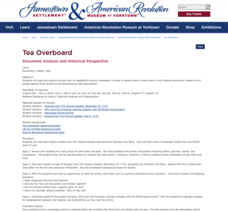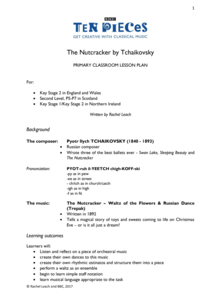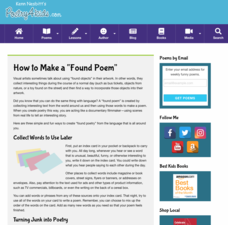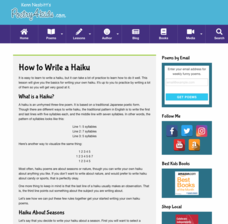US Institute of Peace
What Does Conflict Mean?
Is conflict always bad? Learners begin a unit on conflict resolution with an exercise that defines conflict, reviews common words associated with conflict, and encourages partners to brainstorm conflicts that may have positive results.
Southern Poverty Law Center
Evaluating Reliable Sources
A lesson plan instills the importance of locating reliable sources. Scholars are challenged to locate digital sources, analyze their reliability, search for any bias, and identify frequently found problems that make a source unusable.
Advocates for Human Rights
The Rights of Migrants in the United States Lesson Plan: Traveling Suitcases
Two activities bridge English language arts and social studies to take an inside look into immigration. Scholars interview a family member or someone they know who immigrated here. A crafted suitcase features information obtained in the...
Jamestown-Yorktown Foundation
Colonial Tobacco Economy
Tobacco as money? Middle schoolers investigate how eighteenth-century Virginia farmers used tobacco as a cash crop to buy tools, livestock, and household goods. They also examine the connection between tobacco production and the slave...
Goethe-Institut
Well-Known Tale: The Pied Piper of Hamelin
"The Pied Piper of Hamelin" is the focus of a lesson designed to shed light on the importance of keeping promises. As a class, scholars take part in a discussion on the topic of honesty and consequences. Independent readers then take to...
Jamestown-Yorktown Foundation
How Do We Know about Colonial Life?
Young history sleuths examine an inventory of the belongings of a Virginia colonist and use deductive reasoning to determine what the document reveals about colonial life. They then use a Venn diagram to compare the inventory with a...
Jamestown-Yorktown Foundation
Tea Overboard
While less well known than the event in Boston, the Yorktown Tea Party was equally decisive in turning community sentiment against Great Britain. To gain an understanding of why the colonists objected to the Tea Act, young historians...
Jamestown-Yorktown Foundation
Life of a Private Lesson Plan
In order to understand the challenges the Continental Army faced during the American Revolution, class members analyze primary source materials including a soldier's journal and an officer's letter, and watch a short reenactment video.
BBC
The Nutcracker by Tchaikovsky
Over the course of six lessons, scholars try their hand at composing and dancing after a thorough examination of the famous ballet, The Nutcracker, by Tchaikovsky. Participants watch and discuss the performance of two dances, create and...
National Council of Teachers of English
Writing Acrostic Poems with Thematically Related Texts in the Content Areas
Scholars scour thematically aligned texts to gather a bank of words they can use in an original acrostic poem.
Bringing History Home
Ellis Island Simulation
Young historians step into the shoes of immigrants coming to Ellis Island. A simulation creates an experience in which participants visit several rooms, go through an interview process, and receive a stamp in their passport—either making...
National Council of Teachers of English
Writing Poetry with Rebus and Rhyme
Young scholars write rhyming poems using rebus. With pictures instead of words, authors create original work about things they love.
Advocates for Human Rights
The Right to a Clean Environment: Right to a Clean Environment Role-Play
A lesson challenges scholars to think critically about the world in which they live. Learners begin by role-playing a character, answering questions, and taking part in a whole-class discussion. They then brainstorm ways they can help...
Arbor Day Foundation
Trees are Terrific...Inside and Out!
Trees are the star of a three-step unit celebrating Arbor Day. Step one takes an in-depth look into the structure of a tree, the process of photosynthesis, and the benefits of the leafy giants. Step two challenges scholars to create a...
BBC
Tales of Hans Christian Andersen
Fairy tales seem like quick, fun children's stories, but asking compelling questions about characters, plot elements, and literary themes can transform them into rich and complex tales. Use a series of eight lessons on Hans Christian...
Poetry4kids
How to Create a “Found Poem”
Writers compose an original found poem by searching for words that inspire them. Words are taken from everyday conversation, books, cut from magazines, the mail, or an already written poem.
Poetry4kids
How to Write a Haiku
A haiku is the focus of an activity that challenges scholars to draft an original poem. Authors discover the origin and components of a haiku, read three example poems, then follow six steps to compose their own.
Read Write Think
Poetry Portfolios: Using Poetry to Teach Reading
Over the course of five periods, scholars create a poetry portfolio. They begin with a reading of the poem, Firefly. With a focus on vocabulary, learners reread the poem then look for sight words and other skills.
Poetry4kids
Simile and Metaphor Lesson Plan
Similes and metaphors are the focus of a poetry lesson complete with two exercises. Scholars read poetry excerpts, underline comparative phrases, then identify whether it contains a simile or metaphor. They then write five similes and...
Education.com
St. Patrick's Day Writing: If I Found a Pot of Gold...
This St. Patrick's Day, young writers imagine they found a pot of gold at the end of a rainbow. After a class discussion and brainstorming, scholars compose a narrative essay making sure they incorporate transitions and at least three...
Canada's National Arts Center
Vivaldi and The Four Seasons
Did you know that Vivaldi’s orchestra was largely made up of girls from an orphanage? Fun facts like this fill a 34-page teacher's kit designed to accompany a cross-curricular study of Vivaldi's The Four Seasons.
Population Connection
Lessons From the Lorax
Is progress progressing too fast? So believes the Lorax, the eponymous character from Dr. Seuss's The Lorax. Young environmental science students read the book and debate the arguments of the Lorax and the Once-ler regarding the value of...
Reed Novel Studies
What Katy Did: Novel Study
What doesn't break you
makes you stronger. Katy, in What Katy Did, learns this lesson the
hard way. After a terrible accident and a long recovery, Katy becomes what she always wanted to be—good and kind. Scholars learn
about Katy's...
Literacy Volunteers of Greater Hartford
Similes Activity using Jazz (featuring Duke Ellington)
Language learners get into the swing of things with a jazzy lesson about similes. They read an article about Duke Ellington, listen to samples of his music, and then try their hand at crafting similes to describe his improvisational and...
























